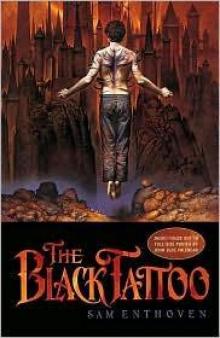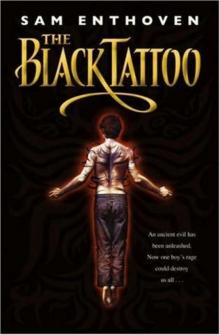- Home
- Sam Enthoven
The Black Tattoo
The Black Tattoo Read online
The Black Tattoo
by
S a m E n t h o v e n
BOOK ONE
"DO I DARE
DISTURB THE UNIVERSE?"
—T.S. ELIOT,
"THE LOVE SONG OF J. ALFRED PRUFROCK"
FRESH BLOOD
London. The West End. A little after four in the morning. At the base of the skyscraper know as CentrePointTower, in the darkness at the end of a dank concrete walkway, something stirred. The shadows there began to ripple and coalesce. The dark became a manlike shape of pure liquid black. Then the demon emerged, taking its first leisurely step toward the woman who stood there watching it.
"Jessica," it said.
Hearing that voice again, and the way the sound of it seemed to take shape inside her head like black flowers blossoming behind her eyelids, it was all Jessica could do to stop her legs from trembling. She'd been so close! Another few minutes and she'd've made it! She gritted her teeth and told herself to concentrate. The demon took another step. It was clear of the shadows now, and the rainy orange streetlight glinted off its inky wet skin. Its face was a blank, but she could feel it looking at her.
"You should not have come back," it said.
Slowly Jessica put down the plastic bag full of fourteen years' worth of carefully hoarded tobacco shreds and cigarette ends that she'd been collecting and saving for this moment. She unbuttoned her filthy overcoat.
"Really," she replied. And what makes you say that?"
"You must have realized that I can't let you warn them," the demon told her. "You must have known that if I found you you'd be killed, and what knowledge you possess would die with you — but you still came. Why?"
"Confident," said Jessica, "aren't you?"
Her amber eyes glittered. Her hard brown hands lifted fractionally from her sides.
The demon looked at her.
"Very well," it said. "Since you insist..."
It took one more step—
—blurred into motion—
—and attacked.
Jessica wasn't as young as she used to be. She'd been expecting the demon's charge, but her reactions had slowed over the years since they'd last fought. When she leaped, with superhuman speed, six feet straight up in the air, flinging herself in a twisting forward roll so tight it left her dizzy, she was, therefore, slightly too late. Her knackered old trainers clipped the demon's back as it flashed past beneath her. She was slightly off balance as her soles smacked back onto the concrete — and the first knife she threw as she landed went wide, spanging off the walkway's railing and spinning off into the night.
Smoothly her right hand whipped back and out again, but the demon had already recovered itself; it swatted her second knife out of the air with something very like contempt. Jessica held her breath as she reached for her third: the blade crossed the space in a flash of silver and struck the demon in the face, right between where its eyes would have been if it had been a person.
But it was not a person. Grimly she watched her knife vanish into the glossy darkness, leaving barely a ripple. The demon didn't even break stride. With the best speed she could muster, Jessica dived to one side. She just had time to notice that the demon had anticipated her...
...when she felt a blow that took her breath away.
The concrete wall at the end of the walkway was a clear twenty feet behind her; the blow flung her the distance in less than a second, and she smacked into the wall back-first. Helpless with pain, she slid to the floor, waiting for the follow-up that would finish her.
But it didn't come.
When she looked up, the demon was watching her.
"Feeling your age, Jessica?" it inquired.
Jessica didn't answer. Her bones were aching, and she could taste blood in her mouth, warm and coppery. She gritted her teeth and got to her feet, keeping one hand behind her back. Magic, she was thinking. All right: she was going to have to use magic.
"I sympathize," said the demon. "Truly, I do. As you see" — it gestured at itself with one ink-black hand — "I've taken what strength I can from my current host. But he, like you, is old now, and weak. He will not sustain me for much longer."
Jessica said nothing. She was concentrating. Behind her, slowly, agonizingly, the air above her palm wobbled, bulged — then a light appeared. It was a tiny spark at first. The spark glistened and twinkled as she coaxed it into life, gradually becoming a little brighter, a little stronger with each passing moment. It was herself that Jessica was pouring into it — all of her determination, her power, and her hatred condensed into a single, glittering point. The spark grew to a sphere, a whirling globe of orange-flecked and sizzling silvery-blue, as the demon continued to speak.
"What I need," it said, "is a new vessel to work from — fresh blood," it added, "as it were. Someone vigorous yet... pliable. Someone spirited yet suggestible. In short, someone young. Why did you come back?" it asked again, suddenly. "Was it the girl?"
Still Jessica did not reply.
"Well," said the demon, "it doesn't matter." It waved wearily at the hand Jessica still held behind her back.
"All right," it said. "Go on, then. Surprise me."
Jessica bowed her head. She brought out her hand and what was inside it—
—and she smiled.
Already, a thin shell of softer blue was forming around the small globe of light that still danced and whirled over her hand. Another second and the shell seemed to harden, then crush inward, turning the light of the globe to an angry red, then white.
Then, suddenly, the demon was screaming.
Its head tipped back, the glistening liquid black of its jaws gaping so far they seemed to roll and fold back on themselves. Its body was flailing now, around where the light was hitting it, reaching and flailing as if being blown about in a wind tunnel, and all the time the scream went on and on.
The sound was one Jessica knew well. She had heard it in her dreams every night for fourteen years: a sound like paper tearing in your head; an intaken, wailing, braying sound that shot up in pitch like a rocket — a sound like nothing on Earth.
Her amber eyes flashed as she stared the demon down. Holding the light out in front of her, Jessica walked toward it. It was reaching for her: long, liquid-black fingers were grasping at the light, testing her will, checking her strength, but Jessica fought with all her heart, forcing the demon back, step by step. Without taking her eyes off it, she reached out and picked up her bag.
From her years on the streets, Jessica had learned to make the best use she could of whatever materials came to hand. Manifesting her power externally for any length of time was exhausting, but certain substances (Jessica had discovered) could be induced to hold magic, storing it up and releasing it slowly like a battery does an electric charge.
Tobacco, for example.
She began to pour the bag's contents out on the ground at her feet, a little at a time, as evenly as she could with just one had. Slowly, steadily, she let the precious stuff fall, shaking it out, forming a line on the concrete between herself and her enemy. Holding the blazing light above her head, she forced herself to turn her back on the demon as she continued to pour. The bag went empty: her collection of shreds and dog ends flared briefly, then blackened as she completed the protective circle. She sat down and crossed her legs.
Suddenly, the demon seemed to realize what she was doing. It sprang toward her in a spreading flood of darkness — swallowing the walls, the rain, the world outside, and everything. Jessica took a deep breath. Forcing herself to blank out everything except the light of her will, forcing herself not to think of what would happen if that light went out...
... she closed her eyes.
* * * * *
The sound of the door buzzer,
long and ugly, ripped Esme out of her sleep. The dream she'd been having was one she had often: a long, slow, freezing kind of dream, full of darkness and falling and cold that squeezed stony fingers round her heart. It was a frightening dream, but in a moment Esme had dismissed it as usual. She opened her eyes.
Her thick black curly hair had swung forward around her face, which meant she was on the ceiling again, where she always seemed to wake up. Parting her hair with her fingers, she floated soundlessly to the cushioned floor of her bedroom and walked the two steps to the intercom by the door. Just as she reached it, it crackled: her father had reached his first.
"Yeah?" he said, his deep voice managing to convey in that one syllable just how unhappy he would be if the person at the door turned out to have woken him up for no reason.
"Raymond?" said the voice from outside.
There was a pause.
"Nick?" said Raymond hoarsely — and suddenly, Esme's blood turned to ice.
She pressed the button. "I'll be down in a moment," she said.
* * * * *
Nick was small and thin and dressed in black from head to foot: he wore a black suit, black shoes, a black shirt open at the neck, and black silk gloves on his hands. His beard and mustache were as dark and neat as the rest of him, but there were deep lines of worry at the edges of his glittering blue eyes. He looked older than Esme had been expecting, old and very tired.
"Esme," he said. "Good to see you."
"You too," Esme lied. She and Raymond had been preparing for Nick's return almost the whole of her life. She was nervous.
"Can I get you anything, Nick?" boomed the grinning giant standing by the table. "Cuppa? Something stronger, maybe?"
Raymond, in contrast to Nick, was massive. His nose was squashed flat, his ears were out of shape, and he had no discernible neck of any kind, just an immense black beard with wispy white streaks in it, behind which his great bald clump of a head seemed to join straight onto his shoulders. In the army-issue undershirt he was wearing, his hairy arms looked huge. His meaty red hands, with their swollen knuckles, were resting easily on the back of a chair. But Esme knew from the way his fingers were clenching that Raymond was almost as nervous as she was.
"This isn't a social visit," said Nick.
Esme watched him. Nick took a deep breath and closed his eyes. Before he spoke, his face seemed to sag inwardly.
"I'm afraid," Nick said softly, "that the Scourge has escaped again." He looked up. "We're in trouble."
The grin fell off Raymond's face: a second later, he looked like he'd never smiled in his life. "How?" he said.
"I don't know," said Nick. "I can only assume one of the others must have released it. But one thing's for sure: the Brotherhood's in no shape to handle this as we are. We're... going to need some new recruits."
Surprised, Esme and Raymond exchanged a look.
"Have we time?" asked Raymond. He had never been very good at hiding his emotions, and the skepticism on his face was clear to see.
"No," Nick snapped, "I dare say we don't. But we'd be useless against the Scourge right now, and you know it."
Raymond blinked.
"We... do have young Esme here," he said carefully. He took a step closer to the other man and tried for a smile. "I'll tell you what: I've never trained anyone like her. You should see the way she—"
"Yes," said Nick, "but in case you haven't noticed, there's only one of her, and that's not going to be enough! "
His words echoed around the room. Raymond and Esme looked at each other uncertainly.
"I'm sorry," said Nick, "but we simply must have new recruits — fresh blood," he added, "as it were." He looked at Esme. "Will you help me?"
"Sure," said Esme. "No problem."
CHARLIE AND JACK
The West End stank in the heat of summer: the smell came up at Jack in waves from the warm, gum-pocked pavement. A police sign of the corner warned in five different languages that thieves were operating near the cash machines — don't let anyone distract you, it said — but Jack had seen the sign plenty of times before, and besides, he was thinking. Any minute now they'd be at the restaurant. If he was going to get any answers about what was going on, then he'd better bite the bullet and ask now.
"Er... Charlie?"
No response. Charlie just kept striding ahead of him.
"Charlie?" Jack repeated. "Charlie, wait!"
Only now, when Jack had shouted, did Charlie stop.
Jack Farrell had known Charlie Farnsworth since they'd been put next to each other on the first day of school; Jack wasn't the kind of person who made friends easily, but he'd been impressed with Charlie straightaway, and they'd been best mates almost ever since. Both boys were now fourteen years old; Charlie was a month older than Jack and an inch and a half taller, and his cheekbones stuck out in a way that Jack's only did if he sucked his cheeks in. Charlie's hair was black as night and just tousled enough, whereas Jack's was blond and fluffy no matter what he did with it. Jack, like Charlie, was wearing black jeans and a blue cotton shirt, unbuttoned and untucked over his white T-shirt — but Jack didn't look... well... cool, like Charlie did. All these things were normal — typical, in Jack's opinion — and he'd pretty much learned to get used them. But there was something else different about Charlie that day: it was obvious. Every step he took seemed to be filled with a kind of rage.
"Listen," said Jack, "you want to tell me what's going on?"
"What d'you mean?"
"Well," said Jack patiently, "what's the deal with having lunch with your dad? We haven't done that since we were kids."
There was a pause.
Suddenly, Charlie took a deep breath and said, "He's left."
Jack looked at Charlie carefully. "What?"
"He's left," Charlie repeated, making an exasperated face. "Look, you know how our answering machine's been on all day lately? That's 'cause the day before yesterday, Dad told me and Mum he was leaving — then he left. Okay?"
The words had come out in a rush. For a long moment after, there was silence between them.
"Oh, mate..." said Jack.
"Yeah," said Charlie.
"How did it—?"
"At breakfast," said Charlie. "Saturday morning. He comes to wake me up just like normal — right? Only his voice is all funny and he's like, "Come downstairs, there's something we've got to talk about.' So I go downstairs, and Mum's got this... expression on her face..."
Jack could see Charlie was having trouble getting the words out — especially since, at that moment, a group of some forty tourists, all wearing identically ludicrous bright yellow fanny packs, were pushing past on either side of them.
'And Dad says... well, basically... he's going," said Charlie.
"Oh, mate," Jack repeated, uselessly.
"He says he's got this rented flat all sorted out, right? And him and this... woman he met through work are going to live over there for a bit while they work out what to do next. Then he packs a bag of stuff, and, well..." Charlie blinked. "He's gone."
"Mate, I am so sorry," said Jack. It sounded feeble, but what else was there to say?
"Mmm," replied Charlie and grimaced. "Listen," he said, "this is going to be the first time I've seen him since... you know."
"Oh, right," said Jack doubtfully.
"Well... I'd really appreciate you, you know, coming in with me. Backing me up a little bit." Charlie was looking at him. "What do you say?"
Suddenly, Jack began to feel awkward.
If Charlie had asked him to watch zombie films with him until four in the morning, he would've agreed like a shot, as always. Splattery team death matches on the Internet? Likewise, sure, no problem. This, however...
"Please," said Charlie.
Jack looked at him. Charlie was his friend. Of course, there was no choice, really.
"Well..." He shrugged. "Okay."
Charlie let out a sigh of relief and put his hand out. They shook.
"Thanks, man."
"Sure."
Charlie's smile faded quickly. "Well," he said, "here goes."
* * * * *
"Charlie," said Mr. Farnsworth, standing up as soon as he saw his son. He took a couple of steps across the room toward him, his arms opening for a hug — then he caught sight of Jack. His eyes widened for a moment: his smile stayed in place, but Jack knew, at that instant, that he shouldn't have come.
"And Jack!" said Mr. Farnsworth, letting his hands fall to his sides. "Good to see you. Come and sit down: the duck's on its way."
They sat. There was a very long silence.
"So..." said Mr. Farnsworth. "How are things at home?"
"Not great," said Charlie, "since you ask."
There was more silence for a moment as Mr. Farnsworth waited to hear whether Charlie had anything to add to this. Charlie didn't.
"And... how's your mum?"
"How do you think?"
Jack looked up from his plate to sneak a glance at Charlie's dad, but Mr. Farnsworth noticed, so he had to stare quickly down again. Jack heard him take a deep breath.
"Charlie," he began, "I—"
The waiter glided up with the Peking duck.
The small round straw box of pancakes arrived first, together with the dish of hoisin sauce and the plate of spring onions and cucumber. These were followed by the duck itself, which the waiter proceeded to mash into shreds with quick, well-practiced movements. This only took about thirty seconds, but to Jack, with Charlie and Mr. Farnsworth sitting there in silence, it felt like much longer.
"Right," said Mr. Farnsworth brightly, once the waiter had left. He rubbed his hands. "Who's going first?" When nobody answered, he lifted the lid on the pancake box and offered it across the table: "Jack?"
Well, Jack wasn't made of stone...
"Thanks," he said. He took a pancake and spread a thin layer of the rich, sweet plum sauce across it with a teaspoon. Charlie took one too. Jack noticed a quick smile of relief on Mr. Farnsworth's face at this. Obviously he saw it as an encouraging sign.

 The Black Tattoo
The Black Tattoo Black Tattoo, The
Black Tattoo, The Crawlers
Crawlers TIM, Defender of the Earth
TIM, Defender of the Earth